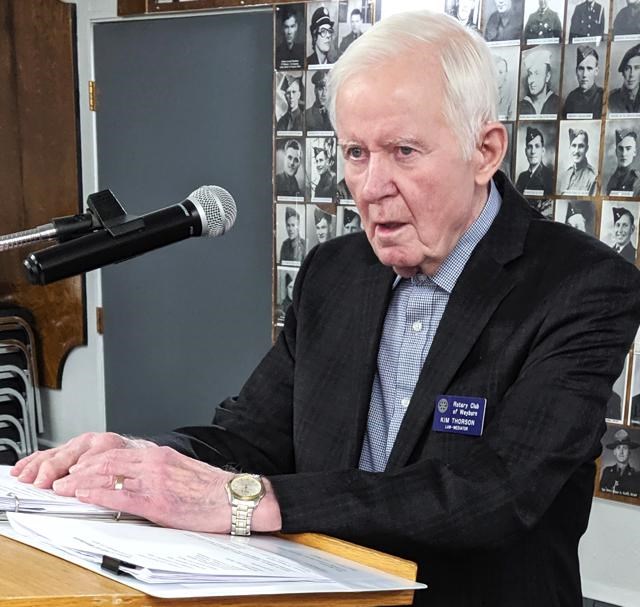A former cabinet minister and retired lawyer, Kim Thorson, values the time and efforts spent as a Rotary Club member for the past 29 years, he told the club in a speech on Thursday.
Thorson was the second “legacy” speaker this month, as the club readies to celebrate their 100th anniversary in Weyburn this year.
He joined Rotary in 1991, and noted he holds the aims and goals of the club very highly, in addition to enjoying the friendships and service that the club is known for.
Born in Macoun in 1932, he grew up on a farm there and attended school in that town as the area experienced the final years of the Great Depression and drought before heading into the Second World War.
His first post-secondary schooling was at the School of Agriculture at the University of Saskatchewan, and in the summer after he graduated in 1954, he went travelling, going from England and France south down the west coast of Africa.
Thorson then took a year in economics, and got a job as a research economist. He entered politics in 1956 when he ran in the provincial election, and was elected to the Legislature for the riding of Souris-Estevan.
When he ran for re-election four years later, he was defeated, and decided to enter the College of Law. Two of his classmates were Stafford Nimegeers of Weyburn (and a current fellow Rotarian), and future premier Roy Romanow.
During his schooling, Thorson’s first summer job was working as an assistant cabinet secretary to Premier Tommy Douglas in Regina.
“One of the things he told me was in this job, we don’t get paid for what we do, we get paid for what we know,” said Thorson.
The following year, he worked with the medical care insurance commission, as medicare was introduced to Saskatchewan and to Canada.
Thorson articled in Saskatoon then moved back to Estevan to practice law on his own, and in 1971, he again ran for office, and was elected along with Allan Blakeney to the Legislature. In January of 1972, Thorson was appointed to cabinet with the portfolio of Industry and Commerce, and was responsible for SaskPower and the Economic Development Corporation.
When Thorson ran for re-election in 1975, he was defeated, and he quipped, “I had four election disasters in my life, twice when I was defeated, and twice when I was elected.”
Thorson practiced law in Regina, until a friend he knew from Midale, lawyer George Hardy, called from Weyburn and asked him to join his practice here as he was going to retire. Thorson came to Weyburn, and was joined by partner Don Horner in 1998, and practiced until he retired in 2012. He married Myrt in 1957, and they raised three children.
He was involved in a number of corporate boards and organizations over the years, including as a board members of the Weyburn Co-op and Weyburn Security, and serving for 22 years on the board of Ipsco Steel Company, as well as seven year on the board of Cameco Corp.
At the community level, he was chair of the Estevan school board, and he and Myrt were active in the United Church. Thorson was a longtime member of the Masonic Lodge, which he joined while he was articling as a law student in Saskatoon.
Later was board member and chairman of the Centre of the Arts in Regina (where he served along with June Barber), and he was a founding member of the Scandinavian Club in Regina in 1976. He attended the 40th anniversary of the club as the emcee.
In the 1990s, he was on the board of the Weyburn Chamber of Commerce, the Weyburn Humane Society, the Weyburn United Way and the Weyburn Hospital Foundation. For a time, he served with Art Wallace on the board of the Soo Line Historical Museum, until it was taken over by the City of Weyburn.
During his 29 years with Rotary, he was president for the 1997-98 term.
“To me what is most important about Rotary is that it brings together people who are divided by religion, different beliefs, politics, or divided by cultural practices or divided by ethnic origins or the colour of your skin. Unfortunately, these differences have divided people so severely, it’s often led to conflicts and war and suffering of millions of people. Rotary rises above that. Rotary acknowledges people are different, but by our actions, we affirm that all people regardless of differences have equal claim to peace, prosperity and happiness,” said Thorson.




